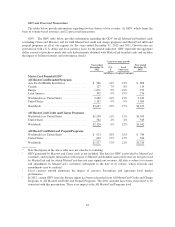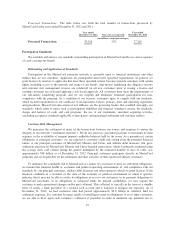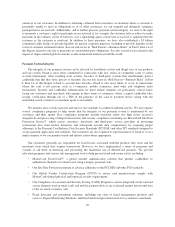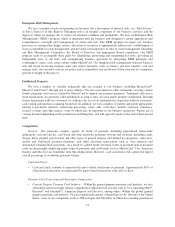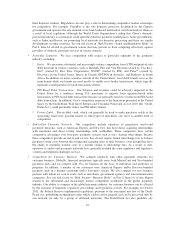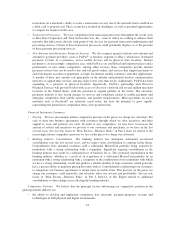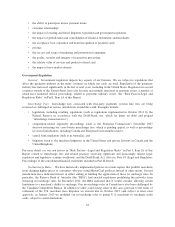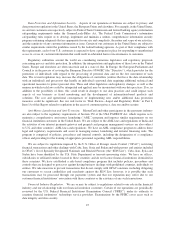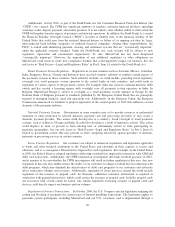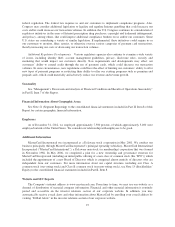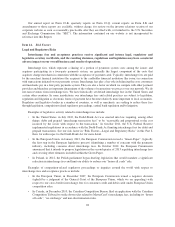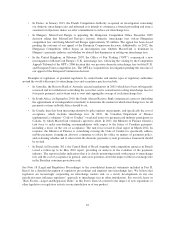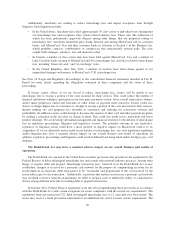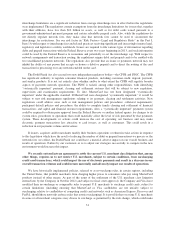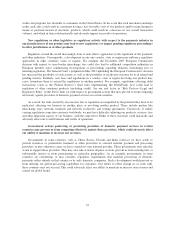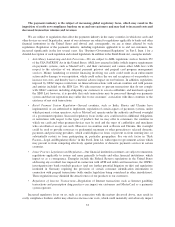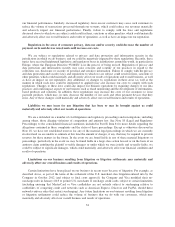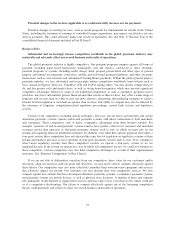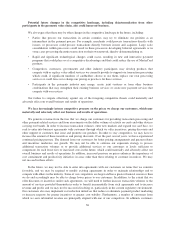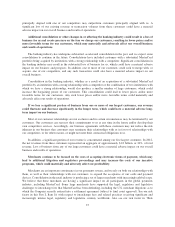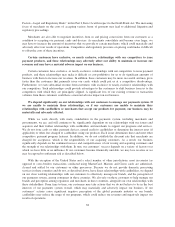MasterCard 2012 Annual Report Download - page 32
Download and view the complete annual report
Please find page 32 of the 2012 MasterCard annual report below. You can navigate through the pages in the report by either clicking on the pages listed below, or by using the keyword search tool below to find specific information within the annual report.Our annual report on Form 10-K, quarterly reports on Form 10-Q, current reports on Form 8-K and
amendments to those reports are available, without charge, for review on the investor relations section of our
corporate website as soon as reasonably practicable after they are filed with, or furnished to, the U.S. Securities
and Exchange Commission (the “SEC”). The information contained on our website is not incorporated by
reference into this Report.
Item 1A. Risk Factors
Legal and Regulatory Risks
Interchange fees and acceptance practices receive significant and intense legal, regulatory and
legislative scrutiny worldwide, and the resulting decisions, regulations and legislation may have a material
adverse impact on our overall business and results of operations.
Interchange fees, which represent a sharing of a portion of payments system costs among the issuers and
acquirers participating in a four-party payments system, are generally the largest component of the costs that
acquirers charge merchants in connection with the acceptance of payment cards. Typically, interchange fees are paid
by the merchant financial institution (the acquirer) to the cardholder financial institution (the issuer) in connection
with transactions initiated on our payments system. Interchange fees play a key role in balancing the costs consumers
and merchants pay in a four-party payments system. They are also a factor on which we compete with other payment
providers and therefore an important determinant of the volume of transactions we process over our network. We do
not earn revenues from interchange fees. We have historically set default interchange fees in the United States and
certain other countries. In some jurisdictions, our interchange fees and related practices are subject to legislation,
regulation and litigation as electronic forms of payment have become relatively more important to local economies.
Regulators and legislative bodies in a number of countries, as well as merchants, are seeking to reduce these fees
through legislation, competition-related regulatory proceedings, central bank regulation and/or litigation.
Examples of legislative activity related to interchange fees include:
• In the United States, in July 2010, the Dodd-Frank Act was enacted into law requiring, among other
things, debit and prepaid “interchange transaction fees” to be “reasonable and proportional to the cost
incurred by the issuer with respect to the transaction.” In October 2011, the U.S. Federal Reserve
implemented regulations in accordance with the Dodd-Frank Act limiting interchange fees for debit and
prepaid transactions. See our risk factor in “Risk Factors—Legal and Regulatory Risks” in this Part I,
Item 1A with respect to the Dodd-Frank Act for more detail.
• In the European Union, in January 2012, the European Commission issued a “Green-Paper” (typically
the first step in the European legislative process) identifying a number of concerns with the payments
industry, including concerns about interchange fees. In October 2012, the European Commission
announced that it intends to propose legislation in the second quarter of 2013 regulating interchange fees
and covering other elements included within the Green Paper.
• In Poland, in 2012, the Polish parliament began drafting legislation that would mandate a significant
reduction in interchange fees and limit our ability to enforce our “honor all cards” rule.
Examples of competition-related regulatory proceedings or inquiries around the world with respect to
interchange fees and acceptance practices include:
• In the European Union, in December 2007, the European Commission issued a negative decision
(upheld by a judgment of the General Court of the European Union, which we are appealing) with
respect to our cross-border interchange fees for consumer credit and debit cards under European Union
competition rules.
• In Canada, in December 2010, the Canadian Competition Bureau filed an application with the Canadian
Competition Tribunal to strike down rules related to MasterCard’s interchange fees, including its “honor
all cards”, “no surcharge” and non-discrimination rules.
28


